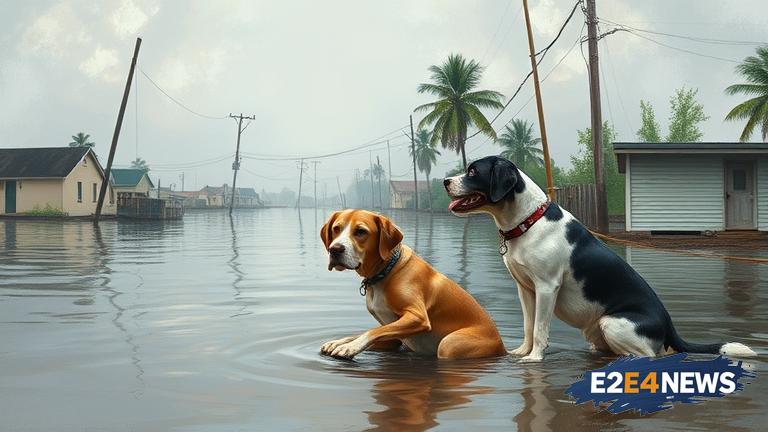In the wake of Hurricane Katrina, one of the most devastating natural disasters in US history, a crucial lesson was learned regarding the importance of saving pets from the catastrophic effects of such events. As the storm ravaged the Gulf Coast, thousands of pets were left behind, abandoned by their owners who were forced to evacuate without them. The heartbreaking images of dogs, cats, and other animals stranded on rooftops, in trees, and on the streets, sparked a national outcry and highlighted the need for a more comprehensive approach to pet rescue and evacuation. In the years since, significant strides have been made in addressing this issue, with many organizations and government agencies working together to develop and implement more effective strategies for saving pets during natural disasters. One key takeaway from the Katrina experience was the importance of including pets in evacuation plans, rather than leaving them behind. This can involve identifying pet-friendly shelters, creating pet evacuation kits, and staying informed about local emergency procedures. Additionally, the development of pet rescue teams and hotlines has greatly improved the response to pet-related emergencies during disasters. These teams, often comprised of volunteers and animal welfare experts, work tirelessly to locate, rescue, and reunite pets with their owners. Furthermore, advances in technology have also played a crucial role in enhancing pet rescue efforts, with social media platforms, online databases, and mobile apps being utilized to facilitate communication, coordination, and resource allocation. The impact of Hurricane Katrina on the animal welfare community was profound, leading to a significant increase in awareness and activism around the issue of pet rescue and evacuation. As a result, many states and local governments have implemented new laws and regulations aimed at protecting pets during disasters, such as requiring pet-friendly emergency shelters and providing resources for pet owners. The Federal Emergency Management Agency (FEMA) has also taken steps to address the issue, including the development of guidelines for pet evacuation and sheltering. Moreover, the creation of the Pet Evacuation and Transportation Standards (PETS) Act in 2006 marked a major milestone in the effort to prioritize pet rescue and evacuation. This legislation, which was signed into law by President George W. Bush, requires FEMA to develop plans for the evacuation and sheltering of pets during disasters. In the years since Katrina, numerous organizations have emerged to support pet rescue and evacuation efforts, including the Humane Society, the American Society for the Prevention of Cruelty to Animals (ASPCA), and the Best Friends Animal Society. These groups, along with many others, have worked tirelessly to provide resources, support, and advocacy for pet owners and animals affected by disasters. The importance of saving pets during natural disasters extends beyond the immediate response, as it also has a profound impact on the mental and emotional well-being of pet owners. The loss of a pet can be a traumatic experience, and being able to save them can be a source of comfort and solace during a difficult time. As the nation continues to grapple with the challenges posed by natural disasters, the lesson learned from Hurricane Katrina serves as a powerful reminder of the importance of prioritizing pet rescue and evacuation. By working together and leveraging the expertise and resources of animal welfare organizations, government agencies, and the private sector, we can create a more compassionate and effective response to pet-related emergencies during disasters. Ultimately, the goal is to ensure that no pet is left behind, and that every animal has the chance to survive and thrive, even in the face of catastrophic events. The legacy of Hurricane Katrina serves as a testament to the power of resilience, compassion, and determination, and it is our hope that the lessons learned from this tragedy will continue to inspire and guide our efforts to save pets and support their owners during times of crisis. As we move forward, it is essential that we continue to prioritize pet rescue and evacuation, and that we work together to create a more just and compassionate world for all animals. By doing so, we can honor the memory of those pets who were lost during Hurricane Katrina, and ensure that their sacrifice is not forgotten. The impact of Hurricane Katrina on the animal welfare community has been profound, and it will continue to shape our approach to pet rescue and evacuation for years to come. As we reflect on the lessons learned from this tragedy, we are reminded of the importance of compassion, empathy, and kindness, and we are inspired to continue working towards a world where every animal has the chance to thrive.
